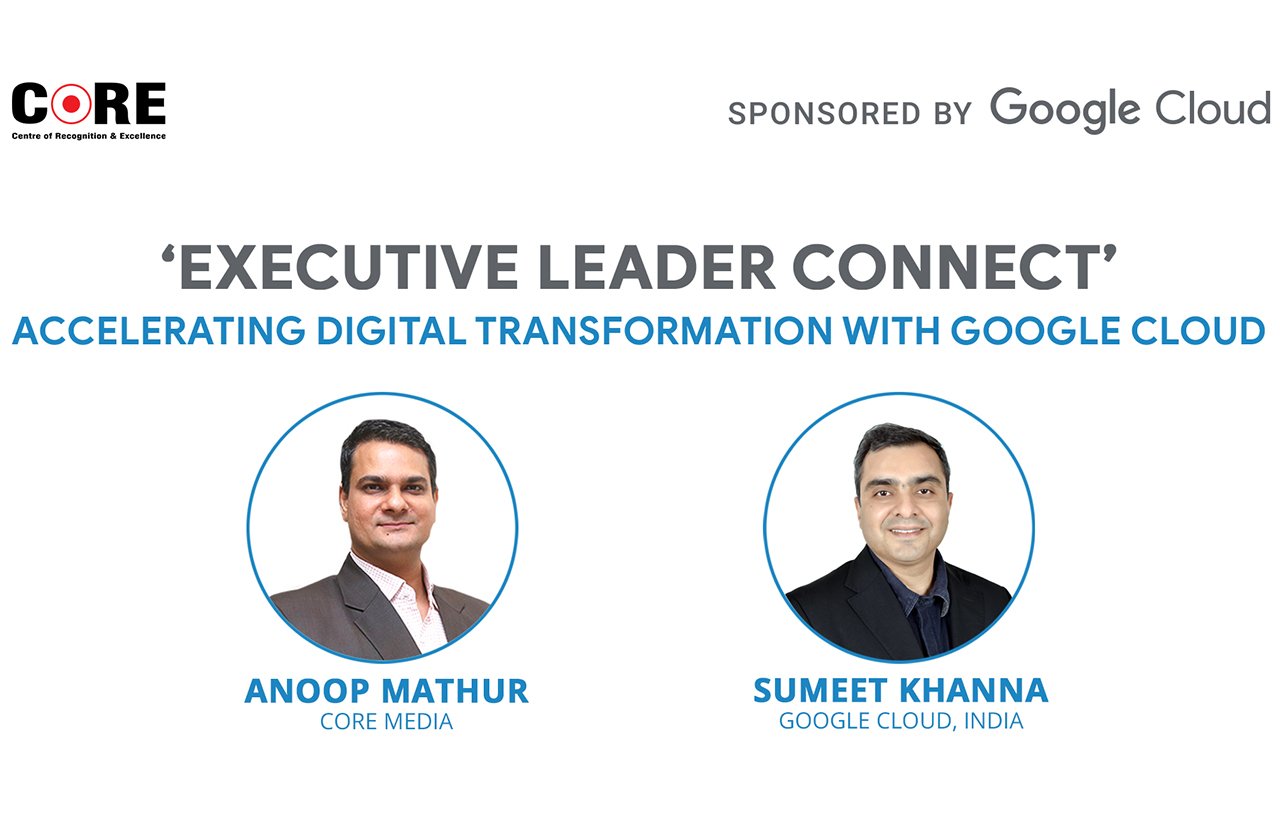Here are the key takeaways from the ‘Executive Leader Connect’ conducted by CORE Media, in association with Google Cloud, featuring senior technology leaders from the industry.
Rise of the New Normal has been the biggest catalyst for innovation and enterprise digital journeys across the globe. Despite the challenges posed, it led organizations to revamp operating models, customer interactions and engagement models in a significant way. Technology leaders clearly are driving this transformation agenda for their organizations by realigning technology models and innovating at breakneck speeds.
While at it, they are increasingly adopting cloud as the most effective platform to bring in the much-needed agility, scalability, elasticity and security.
The recently concluded ‘Executive Leader Connect’—a virtual session curated by CORE Media and powered by Google Cloud—underscored the role of cloud in accelerating enterprises’ transformation journeys while achieving compelling business outcomes.
An exclusive panel of industry leaders and experts from Google Cloud, moderated by Anoop Mathur of CORE Media, put forth some interesting insights around how enterprises are revisiting their cloud priorities in the new digital world to effectively tackle the ongoing challenges.
“IT leaders have been right at the center of the rapid transformation that enterprises are experiencing today. To lead their organizations towards a digitally forward, smart future, CIOs are considerably relying on cloud models. It’s interesting to see how progressive technology leaders are strategizing their cloud roadmaps for the future,” said Mathur, during his welcome note.
Cloud empowers the digital enterprise
A senior technology transformation leader from the industry shared his experience on how he leveraged Google Cloud to build a central data lake that enables data-driven decision making for his organization. Cloud has been instrumental for this organization in deriving valuable data insights, which in turn significantly improved processes and business decisions.
For many leading organizations, cloud is a journey they started several years ago as they set themselves on a path to growth. The New Normal has however fast-tracked this journey by several years.
Another senior technology leader, who heads the IT arm of a leading brand, echoed this view while elaborating how his company drives R&D innovation using cloud for many years. During the pandemic however, the company was quick to further extend the use of cloud to enable WFH and remote collaboration.
Interestingly, many such organizations are looking at further expanding their cloud foot-print in the current dynamic market scenario, especially in areas of digital workflows, AI, ML and IoT.
Among the panelists was a prominent CIO who represents a leading auto component manufacturer. Currently, close to 90 percent of the company’s applications are on cloud and the remaining 10 percent will be migrated to cloud over the next several months.
“Our key learning over the years has been the fact that one cannot achieve scale without leveraging cloud. Most of our critical initiatives—be it AI/ML, IoT, big data analytics, customer access points or after-market applications—are on cloud today. Cloud also gives us the agility to deploy services quickly while eliminating the need for huge upfront cost,” he said.
Does security hamper cloud ambitions?
Security remains a heated debate among cloud experts. While cloud in itself has been widely accepted to be the most secure destination for critical data, several factors on security and regulatory compliance still remain a challenge. “We have been evaluating cloud models for a while now. But being a public sector organization with stringent government regulations, we haven’t been able to make the move because the data we hold is of highly critical value,” said a CIO from a public sector energy company.
However, leading cloud providers today are aware of this challenge. Google Cloud, for instance, has empaneled itself with MEITY (Ministry of Electronics and Information Technology) for providing cloud services to government departments. It was a massive exercise that the company undertook to ensure compliance to the specific regulatory requirements of the public sector.
Google Cloud is already working with many customers from such sectors as it complies with all the regulations that the government of India mandates.
Panelists also highlighted that organizations that restrain themselves from moving to cloud due to regulatory concerns are now actively exploring hybrid cloud models rather than moving lock, stock and barrel to public cloud.
“At Google Cloud, we understand that there is no one-size-fits-all when it comes to cloud. We work closely with our customers in understanding their key priorities and then drawing up a cloud roadmap that addresses their unique requirements,” Sumeet Khanna, Head – North & East, Google Cloud India, concludes.
Resources:


